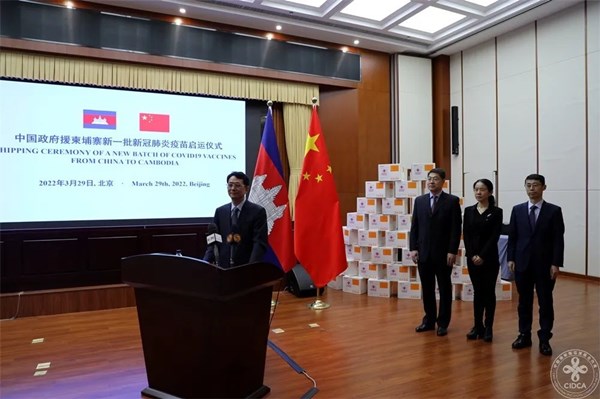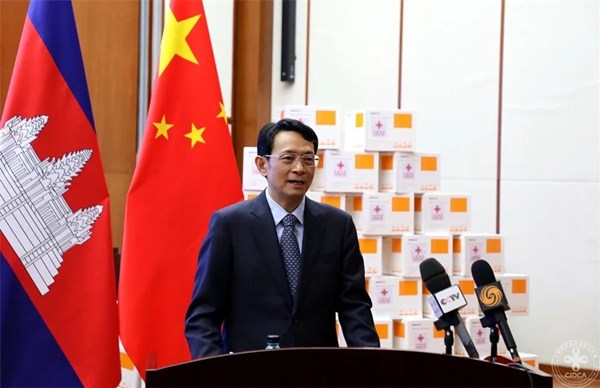CIDCA vice-chairman: China will continue to support Cambodian anti-pandemic fight, narrow world’s vaccine gap
Deng Boqing, vice-chairman of the China International Development Cooperation Agency (CIDCA), attended the departure ceremony of a new shipment of China-donated COVID-19 vaccines to Cambodia on March 29.
Deng discussed the two countries' anti-pandemic cooperation, China's support for Cambodia's post-pandemic recovery, and China's global anti-pandemic and humanitarian assistance during an interview with Chinese and Cambodian media outlets.

He said China will continue to support Cambodia in its fight against the pandemic in response to a question from The Cambodia Daily regarding China-Cambodia anti-pandemic cooperation.
This shipment of 5 million doses of COVID-19 vaccines donated to Cambodia is a concrete action by China to honor its important commitment, Deng said.
The traditional friendship between China and Cambodia has a long history, and the relations between the two countries have become more unbreakable after various tests, Deng said. The two countries have always standing side by side and sharing weal and woe in the common fight against the COVID-19, vividly interpreting the connotation of China-Cambodia community with a shared future, he added.
He said that Cambodian Prime Minister Hun Sen visited China in early 2020 when the outbreak was at its peak, which reflected the valuable support of the Cambodian government and people for China. And when Cambodia was hit by the pandemic, China also did not hesitate to lend a helping hand and provided a large amount of vaccines and anti-pandemic supplies, said Deng.
To date, China has provided 42 million doses of vaccines to Cambodia, making China the most important and safest supplier of vaccines to the country, and helping Cambodia rank among the top in ASEAN and the world in terms of vaccination rate, said Deng. China also sent a traditional Chinese medicine (TCM) expert team to Cambodia on March 16 to carry out medical training, which was the first TCM expert team dispatched by China to support the anti-pandemic fight in other countries, he said. The Cambodia-China Friendship Tboung Khmum Hospital, the largest and most technologically advanced hospital in Cambodia, officially opened on March 21, according to Deng, it is expected to play an important role in the country's drive to enhance its capability to combat the pandemic and advance development of public health system.
In response to a question from the Xinhua News Agency on China's efforts to help Cambodia's post-pandemic recovery, Deng said China's support and assistance to Cambodia is not limited to the anti-pandemic fight, but focuses more on post-pandemic recovery and people's livelihoods,
Focusing on people's livelihoods, China have assisted Cambodia in the materialization of a large number of projects, ranging from rural roads, deep wells and ponds, to primary and secondary schools and mobile medical vehicles, he said, adding that they directly benefit ordinary people in Cambodia.
China also helped Cambodia construct more infrastructure and public facilities, including the Morodok Techo National Stadium, the Cambodia-China Friendship Tboung Khmum Hospital, the Stueng Trang-Kroch Chhmar Cambodia-China Friendship Bridge, and National Highway, Deng said.

He said cooperation under the Belt and Road Initiative proposed by China and Cambodia's Four-Corners Strategy will give stronger impetus to the development of China-Cambodia relations.
During the interview, the Phoenix Satellite Television posed a question on the overall progress of China's anti-pandemic assistance since the outbreak of COVID-19 two years ago.
Since the global outbreak of COVID-19, China has actively implemented its initiative on international anti-pandemic cooperation and the commitment to make the Chinese vaccines a global public good, according to Deng, that was the largest emergency humanitarian operation since the founding of the People's Republic of China.
Deng said China has provided a large amount of anti-pandemic supplies such as masks, protective clothing and respirators to 153 countries and 15 international organizations as well as about 2.2 billion doses of COVID-19 vaccines to more than 120 countries and international organizations, with more than 400 million doses as donation.
China has always upheld the concept of “showing people how to fish than just giving them fish” in international vaccine cooperation, Deng explained, the country not only provides vaccines to other countries, but also helps countries including Egypt and Myanmar to build vaccine production lines and beef up their ability to fight the virus on their own. These actions have made contributions to bridging the immunization gap in the world and won wide acclaim from the international community, Deng said.
He added that China will continue to honor its solemn commitment to provide another 1 billion doses of vaccines to African countries, 600 million of which will be provided as donation, provide 150 million doses and 50 million doses as donations to ASEAN and Central Asian countries respectively, and continue to provide assistance to countries in need, so as to defeat the pandemic at an early date.
The Chinese government is very concerned about the international humanitarian situation, and carrying out humanitarian relief has always been an important part of our foreign assistance, Deng said when answering a question from China Media Group about China's humanitarian assistance efforts against the backdrop of COVID-19 and the changing international situation.
Since February this year, the conflict between Russia and Ukraine has displaced a large number of people, and the humanitarian crisis in Ukraine has received wide attention from the international community, Deng said, adding that China has put forward an initiative on the humanitarian situation in Ukraine, and the Red Cross Society of China has provided emergency humanitarian aid to Ukraine.
The Chinese government has provided a new shipment of emergency supplies to Ukraine, including food and sleeping bags, to help meet the needs of displaced people in Ukraine, he said. Emergency assistance from China has also been delivered to Moldova and other neighboring countries to help resettle Ukrainian refugees and people in need, he added.
He said China is willing to continue to provide assistance to Ukraine and other affected countries in accordance with the development of the situation and actual needs, and make efforts to respond to the humanitarian crisis in Ukraine.
China has never been absent in the face of these crises, Deng said. When the situation in Afghanistan has triggered a humanitarian crisis, volcanic eruption disrupted Tonga, the Philippines was hit by a super typhoon, Madagascar has been hit by a strong tropical cyclone, and Sri Lanka, Ethiopia, Djibouti and other countries have been affected by food crises, China provided emergency humanitarian assistance to help these countries cope with their crises. China also calls on other capable countries to further increase support for humanitarian causes, help the relevant countries overcome temporary difficulties, and jointly build a better world.

Follow us on WeChat
京ICP备18041594号-1
京公网安备 11010202005508号

Follow us on WeChat


